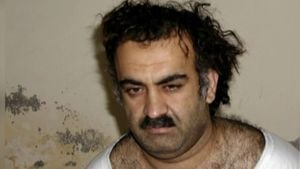Mikhail Kavelashvili, the former football player and new presidential candidate, has been elected as the sixth president of Georgia, receiving 224 votes from the Electoral College, consisting of ruling party members and local authorities. The elections held on December 14 have been characterized by widespread protests against what many are deeming "illegitimate" and "anti-constitutional" proceedings. This controversy has deepened the political divide and triggered debates about the future of democracy and governance within the nation.
The session at the Parliament occurred amid protests outside the building, reflecting the frustration of many Georgians. Outgoing President Salome Zourabichvili, who is set to remain until her term ends on December 29, labeled the elections as "a parody" and "has nothing to do with the political process" as she refuses to acknowledge Kavelashvili's presidency.
Prominent figures within the ruling party have voiced their support for Kavelashvili. Irakli Kobakhidze, the Prime Minister, reiterated, "I would like to congratulate Mikhail Kavelashvili on becoming president. I am confident this election will strengthen Georgian sovereignty and reduce radicalism.”
Support for Kavelashvili within the ruling party has been strong, with Shalva Papuashvili, Chairman of the Parliament, declaring the day historic for Georgia as the parliamentary structure was upheld. He stated, “The main mission of the new president is to create precedents for actions within constitutional parameters.”
Yet these supportive statements have not quelled protests from opposition leaders, who claim the elections should not have taken place. Mamuka Khazaradze of the Strong Georgia party described the election as "a provocation against the citizens" and made it clear the opposition does not recognize Kavelashvili’s presidency.
The political schism has deepened with calls for new elections echoing from the streets as thousands of protesters rally against Kavelashvili's election and the ruling party's influence over the electoral process. Opposition leaders have vowed to fight for their constituents and seek international support to have the current elections recognized as illegitimate. Sofia Djaparidze from the National Movement remarked, "Today we witnessed humiliation for the Georgian people,” echoing sentiments felt by many citizens dissatisfied with the ruling party's maneuvering.
Kavelashvili, meanwhile, seeks to position himself as a unifier amid the tension. He stated, "We want to join the EU, but at the same time, we have our national interests," indicating his desire to navigate between European aspirations and national sovereignty.
Critics of Kavelashvili’s election highlight fears of increased polarisation and radicalisation, reflecting on his connection to past controversial policies and questioning his capabilities to meet the nation’s needs. They argue this setup mirrors previous governments’ failures to embrace democratic values and promote unity.
The international community has been slow to respond to Kavelashvili's election. Notably, no Western leaders have officially congratulated him on the recent win, indicating serious concerns over the legitimacy of the electoral process. Discussions among European Union foreign ministers scheduled for December 16 could determine the international community's stance on Georgia's current governing situation.
Going forward, the political atmosphere remains charged, with protesters committing to remain active participants until they see acceptable changes and reflections of their voices within the government. How Kavelashvili maneuvers through this complex political climate could drastically shape Georgia's future and its relationships with the West and Russia.
With the country divided over issues of governance and legitimacy, this election marks not just the ascension of Kavelashvili but also the beginning of what many predict will be turbulent times for Georgian politics as citizens continue to fight for their democratic rights and aspirations.



